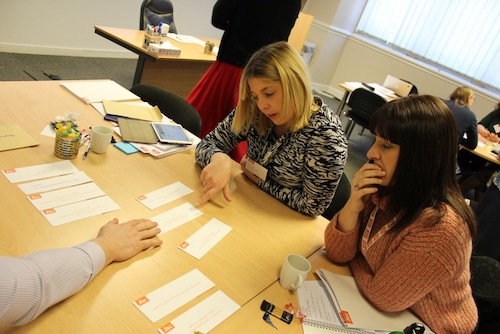In the Learner experience collection phase of the FE Digital Student study we conducted 12 focus groups at 6 colleges in England, Scotland and Wales
We met a total of 220 learners on L1 – L3 programmes across:
- Child Care
- Health and Social Care
- Creative Media
- Animal Management
- IT
- Sociology
And in each subject, we met those commencing their course and those in the final year of their course.
Learners were co-operative, articulate and willing to engage, although on a few occasions we needed to use our classroom management skills to engage learners in the activities. We found putting sweets on the tables was a good icebreaker!
We met with learners in their cohort groups, where learners already knew each other and were comfortable speaking in front of their peers. We also wanted any subject differences to come through clearly.
The details of how the focus groups were conducted are explained in the Focus Group Protocol. You can also download the card sort items for printing that we used.

We learnt a good deal about conducting learner experience research in an FE setting. Here are some tips if you are thinking of conducting your own focus groups:
- Liaise with the class teacher in advance to ensure the room is appropriate and learners are expecting you
- Have any paperwork [consent forms, learner profiles] completed in advance of the focus groups
- Two people (at least) are needed to manage multiple groups in a room, especially if you are planning to make audio recordings.
- Set aside about 15 minutes to prepare the room in advance
- Have sweets/chocolates on the tables to start, to set up a warm atmosphere, if this is acceptable in within the organisation.
- Learners might not be clear about what research is and what is expected of them. Take time to explain this at the start.
- Put forward a clear rationale to answer the ‘what’s in it for me?’ question
- Be prepared to brief any Learning Support Advisors to ensure they do not contribute themselves.
The FE Digital Student project has produced the following resources which you are welcome to download and use:
- FE Digital Student Focus group protocol
- FE Digital Student learner profile
- Card sort items for printing
- FEDS focus group consent_form
- Focus group findings
Contributed by Marilyn Hockley and Ellen Lessner
